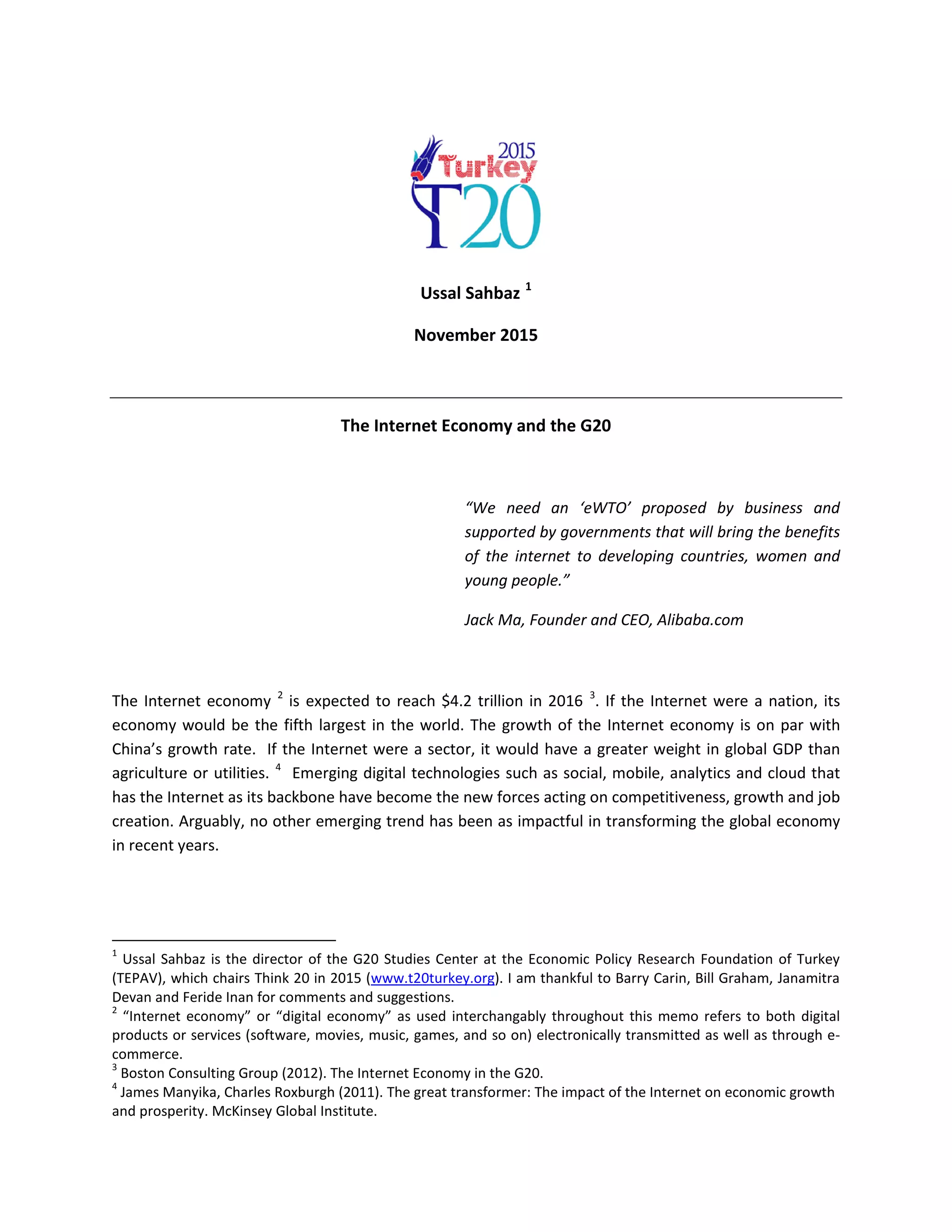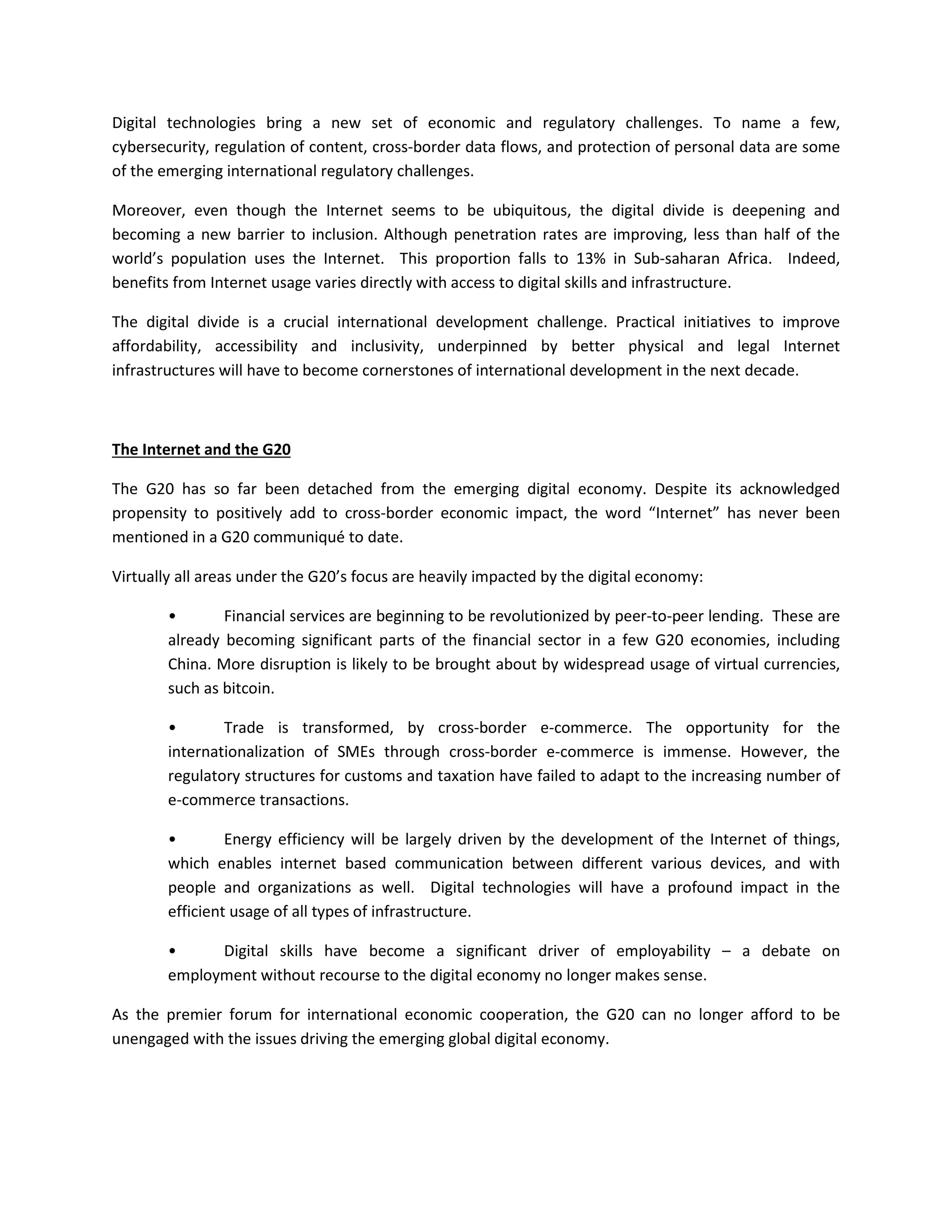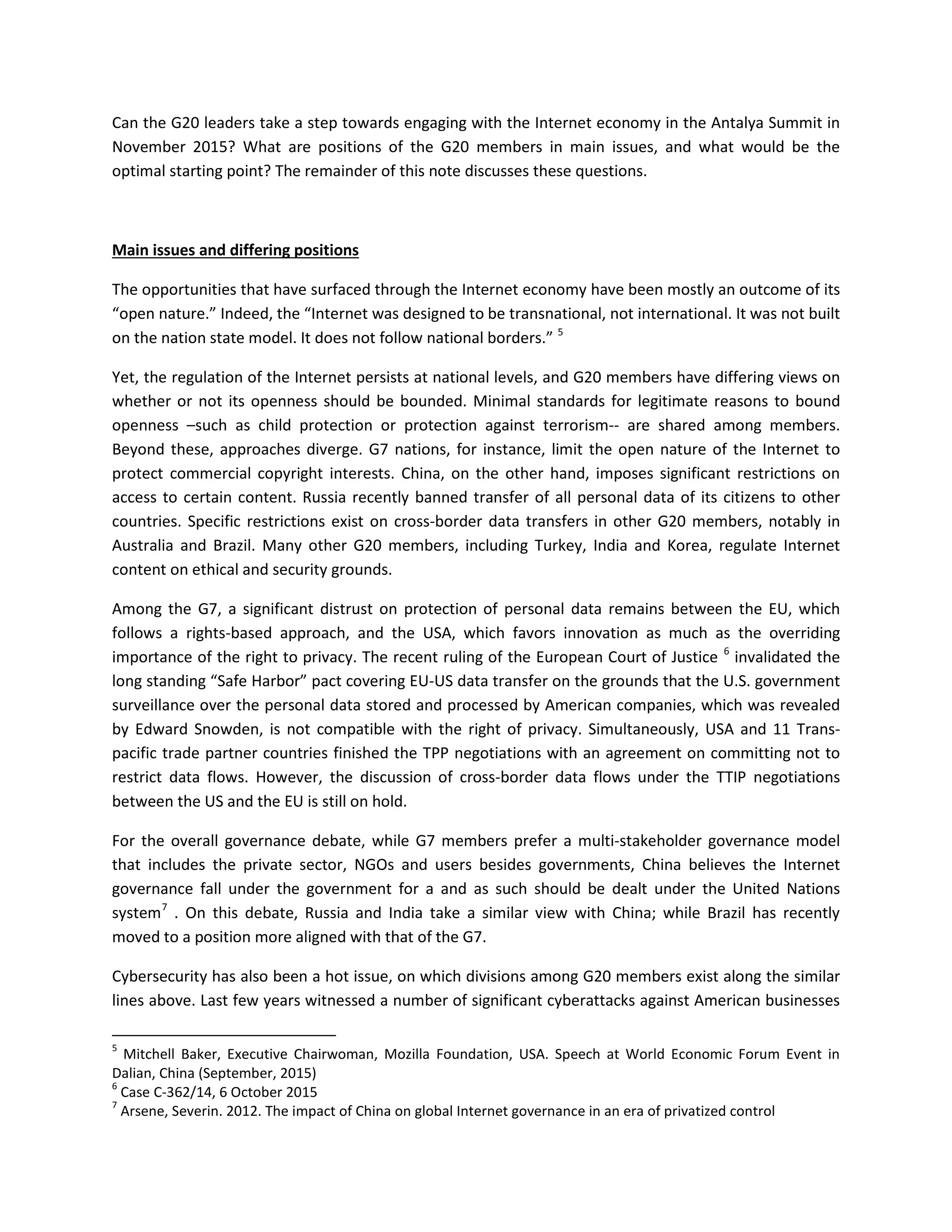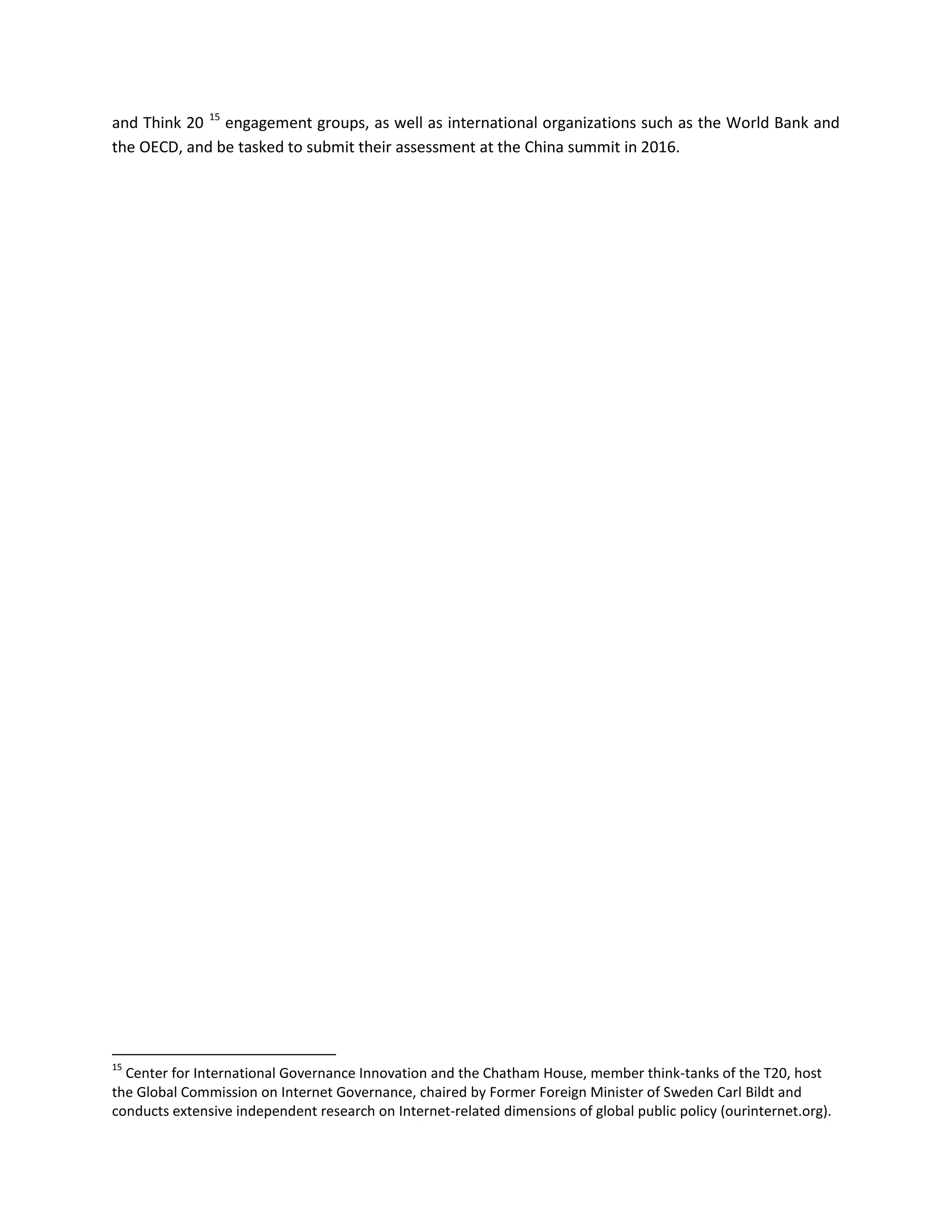The document discusses the growing importance of the internet economy and digital technologies, and argues that the G20 should engage more directly with issues related to the digital economy. It notes that while G20 members have differing views on internet governance, they could focus on areas of agreement like facilitating e-commerce, developing digital skills, and using information and communication technologies to promote development. The document suggests that ICT for development would be a suitable starting point for the G20 to begin discussing the digital economy.



![that originate from China. American response has been a mix of legal action, cyber-retaliation and
diplomacy. In September 2015, American and Chinese presidents came to an agreement to stop
commercial cyberattacks. However, a global framework for governments on cybersecurity that is similar
to nuclear nonproliferation agreement is still far away. The division between the multi-stakeholder
approach and a more government-centric intrusive approach jeopardizes a potential international
coordinated response to cybersecurity threats.
Where to begin?
As much as the fundamentals of Internet governance have been inordinately contentious among G20
members, it is right that the G20 is the forum that should continue to debate positive outcomes for the
welfare of Internet participants all around the world. So what should be the optimal starting point
among the large set of economic and regulatory challenges brought by the Internet?
This year the Business 20 and Think 208
have stepped up the debate on the digital economy. The B20
policy summary states “fully realizing the potential of digital technologies will be an important
component of implementation across all recommendations given their impact on productivity, costs,
reach, and transparency.” On October 6, 2015, the B20 for the first time, held a Forum on the Digital
Economy and published a comprehensive policy paper on this issue. 9
The T20 for the first time discussed Internet governance issues as a primary focus area, and organized a
special session in its June workshop in Izmir with over 60 participants. The overall conclusion of these
efforts could be summarized as follows: While it is difficult for the G20 to take a unified stand on
Internet governance, it should nonetheless take collective action to improve the digital economy for
global economic growth and job creation. Therefore, the G20 should focus on areas related to its core
expertise, for example, in facilitating e-commerce, SMEs’ integration with the digital economy, and
infrastructure, skills, and ICT for development. These are areas that G20 members can broadly agree on
advancing the role of the Internet 10
.
Among all these areas, ICT for development is a suitable candidate to begin the dialogue. “Significantly
increas[ing] access to information and communications technology and strive to provide universal and
8
Business 20 and Think 20 are official engagement groups of the G20. B20 is a dialogue platform between the
global business and the G20. T20 is a global network of think-tanks that provides policy ideas to the G20.
9
For the B20 Policy Summary and taskforce policy papers, please see www.b20turkey.org/policy-papers/. Digital
economy related recommendations include: incorporating a five-year universal broadband connection target into
G20 Member Growth Strategies; improving SMEs’ access to the digital economy; improving the global trade
system for the emerging digital economy (including improving access to IT products by accelerating finalization of
the proposed expansion of the Information Technology Agreement, facilitating customs procedures with a direct
focus on cross-border e-commerce transactions, and rolling back data flow restrictions and improving standards
for cross-border data security); improving digital skills for increasing employability; and improving e-government
systems in cross-border systems and public procurement.
10
Bill Graham (2015). Final report (unpublished) of the Internet governance session at the T20 workshop (June
2015, Izmir)](https://image.slidesharecdn.com/5e6ebf81-bafd-4d36-b83c-2b467359db0c-160220173001/75/The-Internet-Economy-and-the-G20-4-2048.jpg)
![affordable access to the Internet in least developed countries by 2020” is one of the targets in the
Sustainable Development Goals 11
.
Not surprisingly, more than a dozen international bodies are already engaged in advancing ICT for
development 12
. The G20 is in the best position to coordinate and catalyze the actions of these bodies,
and raise the profile of ICT for development. The role that the G20 can take could begin by,
1. stepping up capital contributions to existing initiatives,
2. pursuing new ideas [such as “Internet Bonds” analogous to “green bonds”, or initiating
statistical reforms so that Internet goods and services are appropriately recorded in the national
accounts]
3. creating new institutions, analogous to the Global Infrastructure Hub, that could be
mandated to enhance the dialogue and policy on the new Digital Economy 13
.
Moving towards a new consensus in Antalya
These steps can begin to evolve a new consensus among G20 members, multilateral development banks
and international organizations that would guide nations on acceptable digital economy behaviors that
would, in turn, pave the way toward Internet-based globalization. Just like the nature of the Internet,
this new consensus should develop via a bottom-up process, of course predicated on open discussion.14
However, political leadership is critical to move us towards this new consensus.
To initiate this move, the G20 can take a leading role. One of the ways through which G20 can start to
act is to establish a formal group should start exploring where the G20’s particular areas of competence
and authority can contribute positively to Internet governance. Such a group can include the Business 20
11
Sustainable Development Goal 9, Target 9/c
12
Barry Carin (2015) Option to Promote Development. Background Note for the Global Commission on Internet
Governance. Carin states that “a world organization chart of bodies promoting ICT4D would include, several
UNCSTD, ITU, UNESCO, UNDP, the World Bank (especially InfoDev), the OECD, the G8, NEPAD, the G20 and its
working groups, the Commonwealth Telecommunications Organisation (CTO), the Broadband Commission for
Digital Development, as well as regional entities like ICT Africa (…) In 2001, the G8 created the Digital Opportunity
Task (DOT) Force, a partnership among international organizations, governments and the private sector, to
investigate the “digital divide” in the developing world. UNCTAD was a co-organizer of the 2015 World Summit on
the Information Society (WSIS) Forum, the world's largest annual gathering of the 'ICT for development'
community, partnering with ITU, UNESCO and UNDP. In October 2015, the 2016 World Development Report will
explore the impact the Internet and digital technologies have on development. “
13
Ibid
14
Kati Suominen. The Seoul Consensus. T20 Turkey Blog Post. http://www.t20turkey.org/eng/pages/blog/b29.html](https://image.slidesharecdn.com/5e6ebf81-bafd-4d36-b83c-2b467359db0c-160220173001/75/The-Internet-Economy-and-the-G20-5-2048.jpg)
